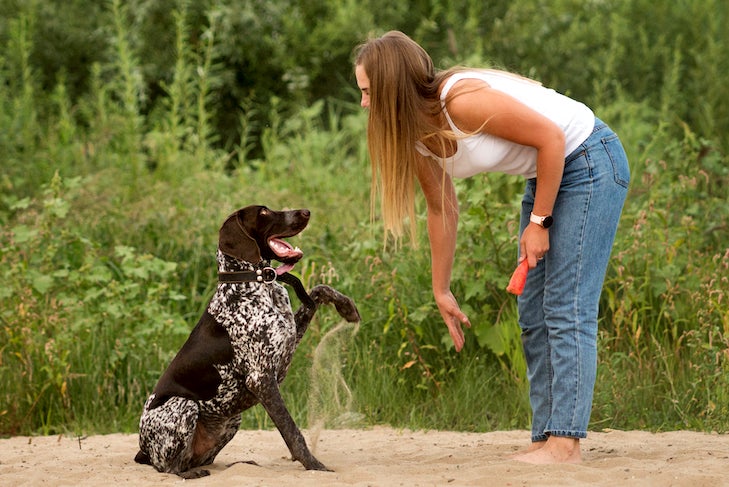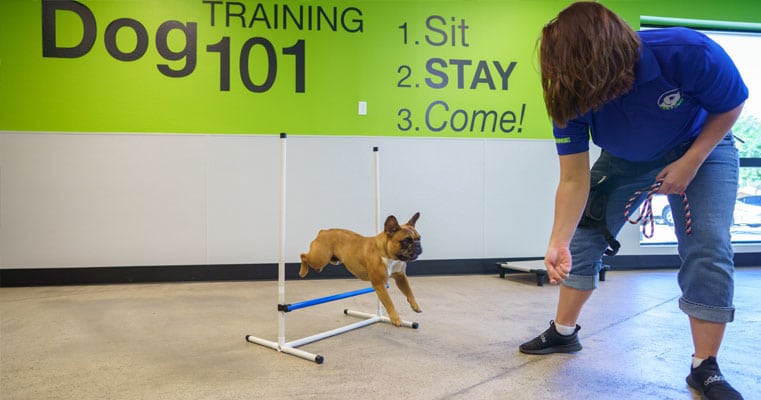Dog Training Charlotte NC: Your Path to a Mannerly Dog
Dog Training Charlotte NC: Your Path to a Mannerly Dog
Blog Article
Unlock Your Pet dog's Prospective: Proven Pet Dog Training Approaches for Success
Effective dog training is a nuanced process that hinges on recognizing canine behavior and utilizing clinically backed approaches. By integrating favorable support, establishing clear commands, and prioritizing socializing, pet proprietors can grow an effective connection with their family pets.
Recognizing Pet Dog Actions
Recognizing dog habits is vital for efficient training and cultivating a positive relationship in between pets and their owners. A detailed grasp of canine body language, vocalizations, and social communications is vital for identifying their requirements and feelings. Dogs communicate largely through non-verbal signs; for instance, a wagging tail might suggest excitement, while pinned ears can signify worry or submission.

In addition, ecological elements play a significant role in forming a dog's behavior. Adjustments in routine, new surroundings, or the presence of strange people can bring about anxiety or anxiety in dogs. Identifying these triggers makes it possible for proprietors to reduce damaging responses and develop suitable training methods.
Inevitably, a deep understanding of pet dog behavior lays the foundation for successful training approaches, boosting both actions and the overall bond in between the pet dog and its owner. dog training charlotte. This expertise is vital for fostering a well-adjusted, delighted canine friend
Favorable Support Techniques
Reliable training relies greatly on favorable reinforcement techniques, which have been revealed to produce substantial cause shaping wanted habits in pets. This method involves compensating a canine for displaying particular actions, consequently increasing the likelihood that these actions will certainly be duplicated. Rewards can take numerous types, consisting of treats, appreciation, toys, or play, depending upon what inspires the private dog.

It is important to progressively terminate rewards as the pet dog discovers the actions, transitioning to intermittent support. This method maintains the behavior with time while preventing reliance on consistent benefits. By concentrating on positive support, instructors can grow a relying on partnership with their pet dogs, promoting a participating and healthy training environment that boosts total obedience and performance.
Developing Consistent Commands
A basic aspect of successful pet training is the facility of consistent commands. Consistency in commands is critical for effective communication in between the pet and the fitness instructor. When commands are uniform, pet dogs discover to connect certain words with desired actions, which increases the training procedure and improves understanding.
To develop constant commands, it is vital that all member of the family make use of the same terminology and motions. For instance, if one individual uses "rest" while an additional claims "take a seat," it can produce complication for find out the pet dog. Select clear, unique words for commands and make certain every person entailed in the dog's training complies with these options.
Enhance commands via regular practice, making certain that the pet gets enough possibilities to react appropriately. When a pet successfully adheres to a command, immediate favorable support should adhere to.
Last but not least, hold your horses. Establishing regular commands requires time and effort. With commitment and clarity, you will aid your dog develop a solid understanding of expectations, inevitably leading to a mannerly companion.
Socialization and Exposure
Interacting socially a canine is crucial for fostering a certain and well-adjusted companion. This process includes revealing your canine to a variety of settings, individuals, and other animals to develop their social abilities and flexibility. Early socialization, preferably between the ages of 3 to fourteen weeks, is critical, as it prepares for a pet's future actions.
Throughout socializing, purpose to provide favorable experiences in various settings, such as parks, active streets, and homes with other pets. Introduce your pet dog to numerous stimuli, including sounds, views, and scents, ensuring that each encounter is fulfilling. This direct exposure assists mitigate anxiety and stress and anxiety, leading the way for an extra resistant pet.
Taking part in regulated team play sessions with other pet dogs can additionally boost social skills, educating your pet dog proper communications and boundaries. Constantly monitor your pet's comfort degree during these experiences, progressively boosting direct exposure as their self-confidence grows. Remember, the goal is to develop a well-shaped pet dog that thrives in diverse circumstances, promoting an unified connection with both humans and various other animals. Prioritizing socializing will substantially add to your canine's total happiness and habits throughout ptsd assistance dog their life.
Overcoming Common Training Difficulties

One more regular issue is interruption. Pets might battle to focus in unfamiliar or active setups. Progressively desensitize your pet dog to distractions by beginning training in a peaceful setting and slowly presenting more stimuli as they end up being efficient (dog training charlotte). Positive reinforcement strategies, such as treats and appreciation, can preserve inspiration and emphasis.
In addition, behavior concerns like leaping or excessive barking can end up being discouraging. Address these by educating alternative behaviors, such as resting smoothly when greeting visitors. Uniformity and patience are essential; reinforce desired habits constantly and stay clear of scolding, which can lead to complication.
Finally, recognize that each pet is one-of-a-kind, and training timelines might vary. Tailor your approach to your pet dog's specific demands, and look for professional support if essential. With perseverance and the best methods, conquering these difficulties can result in a trained, satisfied canine buddy.
Verdict
Finally, opening a canine's potential demands a detailed approach that includes an understanding of canine behavior, the application of positive getting a therapy dog reinforcement strategies, and the facility of regular commands. Early socialization and direct exposure to diverse atmospheres better boost a pet dog's adaptability and confidence. By attending to common training difficulties with tailored methods and persistence, a cooperative and unified connection between pet and trainer can be cultivated, ultimately causing a well-behaved buddy efficient in flourishing in numerous scenarios.
Effective dog training is a nuanced process that pivots on understanding canine habits and employing medically backed techniques.Recognizing canine actions is necessary for effective training and fostering a favorable relationship between pets and their proprietors.Effective training depends greatly on positive support strategies, which have been shown to generate substantial outcomes in forming preferred actions in pet dogs. When commands are consistent, dogs discover to connect particular words with preferred behaviors, which speeds up the training process and improves understanding.
In verdict, opening a canine's possible necessitates a comprehensive approach that incorporates an understanding of canine actions, the application of favorable support techniques, and the establishment of consistent commands.
Report this page